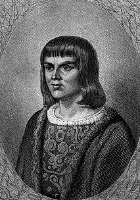Alain Chartier
Alain Chartier Poems
I rode past, thinking, recently,
Like one who's sad and sorrowful,
Of that lament that renders me
Of all lovers the most mournful,
Since, with his dart so dreadful,
...
Alain Chartier Biography
Alein Chartier (c. 1392 – c. 1430) was a French poet and political writer. He was born at Bayeux, into a family marked by considerable ability. His eldest brother Guillaume became bishop of Paris; and Thomas became notary to the king. Jean Chartier, a monk of St Denis, whose history of Charles VII is printed in vol. III. of Les Grands Chroniques de Saint-Denis (1477), was not, as is sometimes stated, also a brother of the poet. Alain studied, as his elder brother had done, at the University of Paris. His earliest poem is the Livre des quatre dames, written after the battle of Agincourt. This was followed by the Débat du reveille-matin, La Belle Dame sans merci, and others. None of these poems show any very patriotic feeling, though Chartier's prose is evidence that he was not indifferent to the misfortunes of his country. He followed the fortunes of the dauphin, afterwards Charles VII, acting in the triple capacity of clerk, notary, and financial secretary. In 1422 he wrote the famous Quadrilogue-invectif. The interlocutors in this dialogue are France herself and the three orders of the state. Chartier lays bare the abuses of the feudal army and the sufferings of the peasants. He rendered an immense service to his country by maintaining that the cause of France, though desperate to all appearance, was not yet lost if the contending factions could lay aside their differences in the face of the common enemy. In 1424 Chartier was sent on an embassy to Germany, and three years later he accompanied to Scotland the mission sent to negotiate the marriage of James I's daughter, Margaret, then not four years old, with the dauphin, afterwards Louis XI. In 1429 he wrote the Livre d'esperance, which contains a fierce attack on the nobility and clergy. He was the author of a diatribe on the courtiers of Charles VII. entitled Le Curial, translated into English by William Caxton about 1484. The date of his death is to be placed about 1430. A Latin epitaph, discovered in the 18th century, says, however, that he was Archdeacon of Paris, and declares that he died in the city of Avignon in 1449. This is obviously not authentic, for Alain described himself as a simple clerc and certainly died long before 1449. The story of the famous kiss bestowed by Margaret of Scotland on la précieuse bouche de laquelle sont issus et sortis tant de bons mots et vertueuses paroles ('The invaluable mouth from which issued and which left so many witty remarks and virtuous words') is mythical, for Margaret did not come to France till 1436, after the poet's death; but the story, first told by Guillaume Bouchet in his Annales d'Aquitaine (1524), is interesting, if only as a proof of the high degree of estimation in which the ugliest man of his day was held. Jean de Masies, who annotated a portion of his verse, has recorded how the pages and young gentlemen of that epoch were required daily to learn by heart passages of his Breviaire des nobles. John Lydgate studied him affectionately. His Belle Dame sans merci was translated into English in the 15th century by Sir Richard Ros, with an introduction of his own; and Clement Marot and Octavien de Saint-Gelais, writing fifty years after his death, find many fair words for the old poet, their master and predecessor. The English Romantic poet John Keats famously wrote the ballad 'La Belle Dame Sans Merci', using the title from Alain Chartier. See Mancel, Alain Chartier, étude bibliographique et littéraire, 8vo (Paris, 1849); D. Delaunays Etude sur Alain Chartier (1876), with considerable extracts from his writings. His works were edited by A. Duchesne (Paris, 1617). On Jean Chartier see Vallet de Viriville, Essais critiques sur les historiens originaux du règne de Charles VIII, in the Bibl. de l'Ecole des Chartes 1857).)
The Best Poem Of Alain Chartier
From ‘la Belle Dame Sans Merci'
I rode past, thinking, recently,
Like one who's sad and sorrowful,
Of that lament that renders me
Of all lovers the most mournful,
Since, with his dart so dreadful,
Death has stolen my mistress,
And left me lonely: left me dull,
In the sole charge of Sadness.
I said to myself: ‘I should cease
Writing and rhyming, it appears,
Abandon laughter, and be pleased
To replace all this with tears.
And so I must employ my years,
Without heart or inclination
To pen a single thing, I fear,
That pleases me, or anyone.
If any would constrain my will
To write of happy things,
My pen would not possess the skill,
Nor my tongue the power to sing.
My lips could never part, in smiling,
Without a gaze that lips betrayed,
Since my heart would claim denial
Through the tears my cheeks displayed.
I leave it to the lover, who nurses
Hopes that his wound might heal,
To make ballads, songs and verses,
That each might his own skill reveal.
My lady, by her will, did steal
At her Death, God save her soul,
And carry away, my power to feel,
That lies with her beneath the stone.
